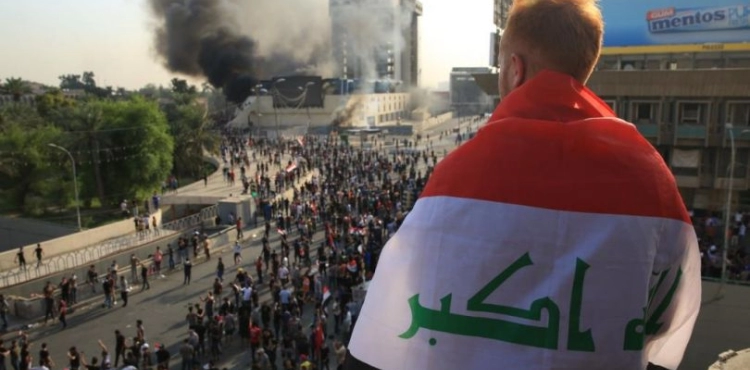BAGHDAD (Reuters) - The Iraqi Human Rights Commission said on Monday it had documented the deaths of two protesters and the injury of nearly 1,000 protesters and security personnel in protests across Baghdad, central and southern Iraq.
The UNHCR said in a statement that it documented the "martyrdom of two demonstrators due to suffocation cases, as well as the number of injured in Baghdad province to 966, including 884 injured demonstrators and 82 security forces, and 5 injuries of demonstrators in the province of Maysan (east), and 3 injuries in the province Muthanna (southern) including 2 security forces, bringing the total number of casualties 974, mostly cases of suffocation due to the use of tear gas. " It also documented "the burning of the headquarters of Asaib Ahl al-Haq (militia belonging to the Popular Mobilization) and the headquarters of the old stream of wisdom party, the Dawa Party, the Bashair movement, the Fadhila party and Badr organization in Muthanna province, the burning of the Dawa party headquarters in Wasit province (central) and the burning of Dhi Qar governorate (south). ) By demonstrators and storming the house of the governor of Wasit. " She pointed to "the use of rubber bullets and tear gas by the security forces to disperse the demonstrators in Tahrir Square in Baghdad." The Commission pointed out that "thousands of demonstrators gathered in front of the building of the provinces of Wasit, Najaf, Diwaniya, Dhi Qar, Missan, Basra, Muthanna and security forces prevent them from entering." She said that "hospitals and health services refrain from providing UNHCR with official statistics on the number of wounded and martyrs," pointing to "the injury of one of the cadres of UNHCR monitoring teams in the province of Muthanna while covering the demonstrations." Iraqi demonstrators resumed their anti-government protests since the early hours of the day in Baghdad and the central and southern provinces of the country to demand the dismissal of the government and reform of the "corrupt" political system. Late on Thursday, Prime Minister Adel Abdel-Mahdi was ahead of the protests by introducing a new package of reforms, including a pledge to confine arms to the state, disband armed factions, ensure freedoms, security and stability, provide the best services and employment opportunities to citizens, and bring corrupt people to justice and hold them accountable. , And to achieve the country´s economic growth. The new wave comes as a resumption of protests that began earlier this month in Baghdad demanding better services and job opportunities and fighting corruption, before spreading to southern provinces with a majority Shiite, and continue for a week. Later, the demonstrators raised their demands and called for the resignation of the government after the security forces resorted to violence and the use of live bullets against the protesters, killing 149 protesters and 8 security personnel.












